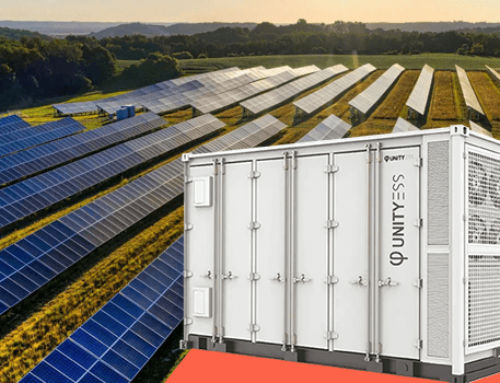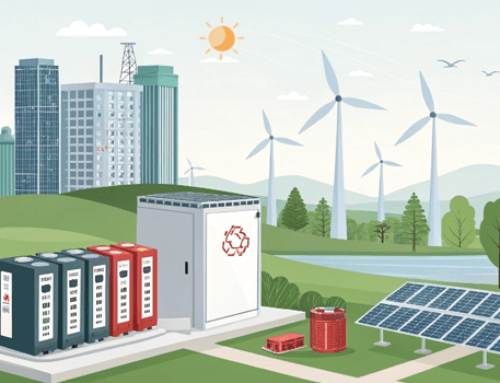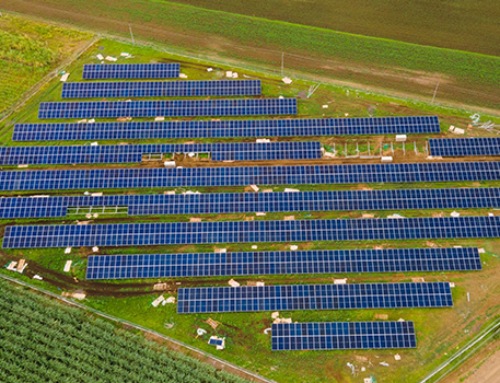

A new report suggests that rooftop solar could generate 65% of the world’s electricity! Since solar energy is now cheaper than conventional power, more people are making the switch.
But what if you don’t have enough roof space for panels?
Thankfully, many Indian states have introduced policies to make solar energy accessible to all. One such policy is Delhi’s Group Net Metering (GNM).
What is Group Net Metering (GNM)?
To understand GNM arrangement, let’s first recall net metering.
In a net metering arrangement, if a consumer generates surplus solar power, they can feed it into the grid. The value of these units sent to the DISCOM is then adjusted in the consumer’s electricity bill.
GNM follows the same principle but applies to consumers with multiple power connections in the same DISCOM area.
The surplus solar power generated at one location is exported to the grid, through the net meter, and is adjusted across more than one electricity connection. In this way, a consumer can share the savings on electricity expenses across connections, by making a one-time investment in a single solar plant.
The only stipulation is that all properties/electricity connections must be under the same distribution company.
How does it work?
Let’s say a consumer owns three properties in Delhi—A, B, and C—under one DISCOM. If only Property A has enough rooftop space for solar, the system is installed there.
- Property A uses the generated solar energy first.
- Any surplus is sent to the grid.
- The extra power is then adjusted against the electricity bills of Properties B and C based on a predefined ratio.

In the GNM application, the consumer must specify the primary consumer, additional properties, and the power distribution ratio.
Group Net Metering, Delhi
Delhi’s group net metering regulations were introduced in 2019. It is applicable for all consumers of the National Capital Territory of Delhi—be it residential or commercial. The state government also introduced several amendments to the policy in 2024.
Under the policy:
- Surplus Energy Adjustment
If a consumer generates more electricity than they use at their primary connection, the surplus is adjusted against the electricity bills of other listed connections, based on the priority sequence set by the consumer.
This priority list can be adjusted once in a financial year, with 2 months advance notice.
- Time-Based Energy Compensation
Surplus solar energy is first used during the same time it was generated (peak or off-peak hours) at the primary location. If there’s any leftover, it’s adjusted in the monthly bill of other connections.
However, this credit of units will be at off-peak rates for businesses and regular rates for homes. It is important to note that since off-peak electricity is cheaper, this means businesses may get slightly lower credits for surplus power.
- Carrying Forward Excess Energy
If surplus energy still remains after adjustments, it is carried forward as an energy credit for future billing cycles, following the consumer’s priority list, until the settlement period ends.
- System Capacity Limits
Ground-mounted renewable energy systems installed under Group Net Metering (GNM) can be up to 5 times the sanctioned load, with a maximum capacity of 10 MW.
There is no such capacity limit for rooftop solar systems.
- Exemption of Charges
Renewable energy projects commissioned under GNM by March 31, 2027, won’t have to pay Wheeling, Banking, Cross Subsidy, or other charges for their entire lifespan.
Projects commissioned between April 1, 2027, and March 31, 2030, will start with a 25% charge, which will increase every three years until it reaches 100%.
How to Apply for Group Net Metering in Delhi
- Visit the website of the Distribution Licensee (DISCOM) to download the prescribed application form for Group Net Metering.
- Fill out the form and submit it to the concerned Distribution Licensee.
- Pay a non-refundable fee of ₹1,000 for the feasibility analysis.
- The Distribution Licensee will assess whether the Solar System can be connected to the grid under Group Net Metering.
- If feasible, the applicant proceeds with the registration process as per the DERC (Net Metering for Renewable Energy) Regulations, 2014.
- Once registered, a connection agreement will be signed to formalize the arrangement
Benefits of Group Net Metering
There are several benefits of a GNM arrangement:
1. Shared savings
Solar can help consumers save up to 80% on their electricity bills. Through GNM, a consumer can distribute these electricity savings from a single solar power plant across multiple connections, without investing in multiple plants.
2. Space Utilization
Shadow free space in cities is limited. The GNM arrangement allows a consumer to utilize an available space and reap the benefits across multiple properties.
3. Low Maintenance
Solar is an asset that lasts more than 25 years and hardly requires any maintenance. All that is needed is regular cleaning of the solar panel and quarterly preventative checks to ensure smooth and efficient working of the system.
4. Government Incentives
The Indian government offers multiple incentives and tax rebates to boost solar adoption in India. Residential consumers who opt for Group Net Metering can avail the central financial assistance of up to ₹78,000 under PM Surya Ghar Yojana. Meanwhile businesses can also enjoy appreciation depreciation on their solar assets.
About Ornate Solar
Ornate Solar is a leading solar company with 10 years of experience in the industry and a mission to reimagine solar installation worldwide.
By partnering with best-in-class solar brands and developing high-quality solutions (solar inverter, accessories, InRoof), we deliver solutions that are modern, reliable, and effective.
If you are looking for high-quality solar solutions, reach out to us at 011 43536666 to discuss your options.














Leave A Comment